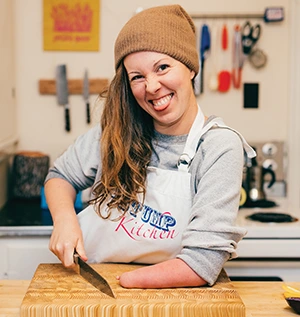by Alexis Hillyard

The first time my parents put a body-powered hook prosthesis on me, I just sat there like a cat that’s been forced to wear a harness or item of clothing—still, awkward, and uncomfortable.
I bet I looked quite funny to my parents. They never really pushed it as I grew up, though, and for that I’m grateful. There are a few old photos of me wearing my prosthetic arm, but I spent most of my childhood prosthesis-free. I moved happily through the world with the body I was given, testing my limits and gaining confidence.
When I was in fourth grade, a viola program was introduced at my school and, being a music lover, I signed up immediately. My teachers had never met a one-handed viola player before, so they brought in an occupational therapist who developed a simple bow prosthesis for me. It was comfortable and very easy to use, and it let me play and learn alongside my peers as an equal. The adults didn’t make a big deal out of it. They just made sure I got the support I needed.
When I took up the guitar in high school, I didn’t use a prosthesis at all—I just strummed with my stump. But one night at an open mic, I looked down and saw drops of blood splashed across the guitar face—I’d been pounding the strings a little too hard for my sweet little stump. My prosthetist came up with a simple, user-friendly gizmo that allowed me to hold a guitar pick.
I drifted away from playing bowed instruments in adulthood. But a few years ago I met a young amputee who played the violin with a specialized attachment. It brought back such happy memories that I decided to start taking lessons again. A good friend loaned me a violin. All I needed was a prosthesis to help me hold the bow.
I hadn’t seen a prosthetist in years, so I made an appointment at a clinic nearby and explained what I wanted. This practitioner had never made a violin arm, but most of the prosthetists I’ve encountered could make anything out of nothing, so I was hopeful. When I got the first version of the arm, it wasn’t very comfortable or easy to use, but this seemed like a small setback. I’d expected that adjustments would be necessary. My prosthetist apparently didn’t, however. He acted as if he had done his job and the device was finished. If I was struggling to make it work for me, that was my problem to solve.
A few weeks later, I learned about a versatile arm cuff that can help upper-limb amputees do various things, including holding a violin bow. I was overjoyed! My prosthetist could simply order the cuff, adjust it to my body, and I’d be on my way. But when I shared this idea with my prosthetist, he seemed hesitant. He didn’t explicitly say that he’d already used up the available funding on my case and didn’t want to put in any more work, but his body language and facial expressions gave him away. I explained how grateful I was for his efforts and how badly I wanted to play the violin, and he did end up ordering it. But the process had been so exhausting and disheartening that my excitement had gone stale. I didn’t pick up the violin much after that.
Last summer, my partner and I decided to take a month-long canoe trip with our two-year-old. It became clear I would need a prosthesis so I could paddle on both sides of the boat, but after my demoralizing violin experience, I was really hesitant. I tried a different prosthetist, one highly recommended by a good friend. This experience could not have been more different. “Your body is perfect the way it is,” she told me. “You know your body best, so I’ll follow your lead.”
I went back to my car and cried happy tears. I couldn’t believe how easy it was, and how seen and supported I felt. In short order I had a device that lets me paddle with comfort and ease. Better yet, I have a new ally who will cheerfully help me solve the next challenge that comes along, instead of making me feel like a burden.
It was truly a life-changing experience. Every amputee deserves this kind of care—but it’s not as easy to find as it should be. We are used to feeling like burdens, because so many healthcare professionals have made us feel like burdens. Advocating for ourselves is a tiring, never-ending obligation. But I was immediately struck when I found a prosthetist that truly wanted to work with me, in partnership: This is how it should feel.
Alexis Hillyard is creator of the award-winning Stump Kitchen channel on YouTube. Find her online at stumpkitchen.com.




